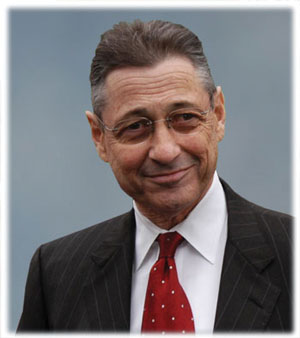BY MICHAEL MCKEE | Sheldon Silver was elected speaker of the state Assembly 11 times, following the premature death of his predecessor, Saul Weprin, in 1994. This means Silver has negotiated renewal of the rent laws three times.
How did he do?
Let’s start with the Great Rent Wars of 1997. In December 1996, then-Senate Republican Leader Joseph Bruno announced that he would not allow a vote on a bill to renew the state rent laws when they came up for renewal the following June. That unleashed a firestorm of tenant activism, with tenants who had never been active banging on the doors of tenant organizations to ask how they could help. Silver immediately became the leader of the opposition, declaring that the Assembly would not pass the state budget until the rent laws were renewed. This was a gutsy move on his part.
During the legislative session, Silver’s advocacy on behalf of tenants was heroic. But on June 15, the day the rent laws expired, he went into negotiations with Republican Governor George Pataki — who opposed rent regulation, but had let Bruno front the campaign to end it — and gave away the store in return for Pataki’s agreeing to renew the rent laws for six years instead of the expected four.
The array of weakening amendments Silver agreed to have inflicted enormous damage on tenants and the supply of rent-regulated housing. The most damaging of these was the vacancy-deregulation provision, which made it impossible for New York City to repeal the similar law that the City Council enacted in 1994 without permission from the state Legislature, and also extended that deregulation to apartments in Nassau, Westchester and Rockland counties.
Another amendment barred investigations into illegal rents from going back more than four years, thereby facilitating rent overcharging and illegal deregulation, and gutting the rent registration system. Others included making it harder for Housing Court judges to stop evictions; letting landlords raise the rent on vacant apartments by an extra 20 percent; removing aunts, uncles, nieces and nephews as family members eligible for the right to take over a lease when the tenant of record moves or dies; and making it easier to evict for demolition.
And then Silver was caught asleep at the wheel in 2003. The next time the rent laws came up for renewal, in 2003, Silver made no effort at all. He and Bruno had a handshake deal before the session began to renew the rent laws without additional weakening amendments. But on the last night the Senate was in session, Bruno double-crossed Silver, passing an unprecedented eight-year extender with two new anti-tenant changes, and then adjourned for the year. An embarrassed Silver was faced with the choice of letting the rent laws expire or swallowing the changes. The Assembly swallowed.
Until then, tenant groups had been only mildly critical of Silver, hoping that he would try to undo some of the damage he’d inflicted on rent-protection laws. But after this dismal performance, Tenants & Neighbors organized a demonstration in 2004 outside his 250 Broadway office. Silver and other Assembly Democrats protested mightily: Why were tenants attacking their champion?
Then there was Silver and Cuomo’s alleged “tenant victory” in 2011. Four years ago, Silver seemed to make an effort to negotiate meaningful changes to the rent-regulation system, made more likely by a muscular tenant campaign and the election of a Democratic governor who favored renewing the laws. But the final result was a disappointment. While tenants fought the real-estate lobby to a draw, getting the laws renewed without weakening amendments for the first time since 1993, the negotiated bill left all the rent deregulation mechanisms in place. It also preserved all the loopholes (major-capital-improvement increases, preferential rents, and the 20 percent vacancy bonus) that enable landlords to jack up regulated rents to the point where tenants can no longer afford them.
And last but not least, in 2013, Silver sold out on J-51 renewal. Despite promising tenant advocates in 2012 that — unless he won important pro-tenant changes — he would not renew the expiring J-51 tax subsidy to landlords who renovate their buildings, Silver did just that. In January 2013, he pushed through a “One Big Ugly” omnibus bill that renewed this program, along with a tax break for co-op shareholders and condo owners. But the only pro-tenant change was one extending protection to a small number of loft tenants, most in north Brooklyn — important protections, but they apply to only a few hundred units. One million rent-controlled and rent-stabilized tenants got screwed again.
The bill also included language that gave 421-a tax breaks to five Manhattan luxury apartment towers that normally would have been ineligible because they contained no affordable housing. A Met Council on Housing report, “Tax Breaks for Billionaires,” blew the lid off this subterfuge a few months later, so the 421-a carve-outs are what most people remember about this bill.
No legislator wanted to take responsibility for that giveaway. The bill’s lead sponsors, Democrats Senator Martin Golden and Assembly Housing Committee Chairperson Keith Wright, both told reporters that they were not aware the legislation included those provisions. Daily News reporter Dan Freedman eventually uncovered the information that Silver was the one who had included the 421-a carve-outs — at the behest of the Real Estate Board of New York.
Aware that Silver was insisting on getting the bill passed, no Assembly Democrat spoke against it on the floor, and only seven voted against it.
This column first ran in Tenant/Inquilino, the monthly newspaper of Met Council on Housing.
McKee is a board member, Met Council on Housing, and treasurer, Tenants Political Action Committee



































